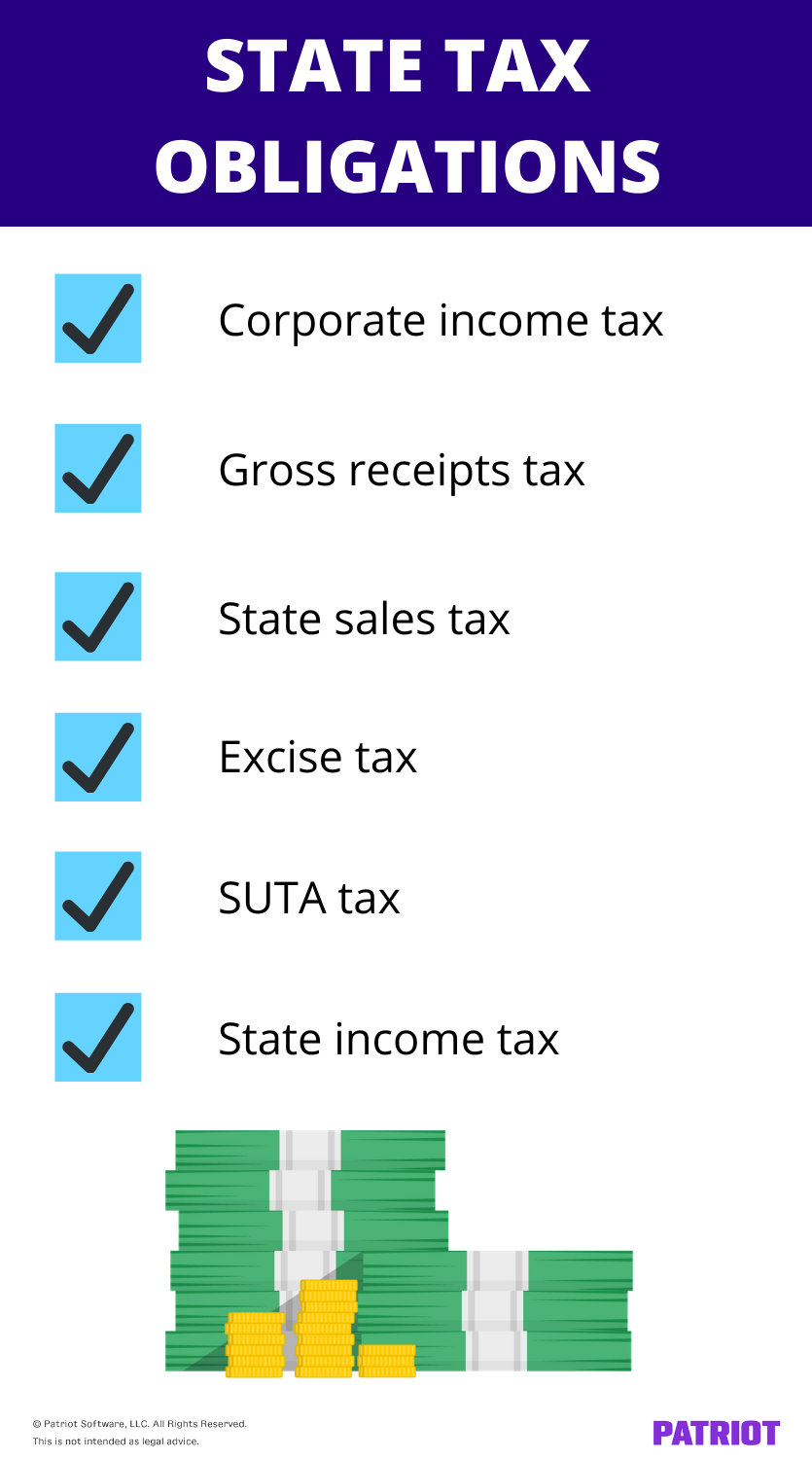As a business owner, you’re responsible for a number of taxes. Some may be federal or local, while others are state taxes. So, what are the types of state tax obligations you need to keep on your radar?
State tax obligations (types of state taxes)
Your state tax obligation depends on your business’s location and the state you do business in. Each state has its own set of rules pertaining to the various state taxes.
You may be responsible for handling the following types of state taxes:
- Corporate income tax
- Gross receipts tax
- State sales tax
- Excise tax
- State unemployment insurance tax
- State income tax

Corporate income tax
If your business is a corporation, you must pay a corporate tax rate on business income. There are both federal and state corporate tax rates; however, we are going to focus on the state rates.
The majority of states levy corporate income tax in addition to the federal rate. Currently, there are 44 states that impose a corporate income tax on corporations. South Dakota and Wyoming do not have a corporate income tax. And, four states impose a different type of tax instead of corporate income taxes (which we’ll get to later).
Corporate income tax rates vary by state and range from 1% to 12%. In most cases, a corporation’s rate is based on how much the corporation earns.
If you own a corporation, report your profits and losses on Form 1120, U.S. Corporation Income Tax Return. You must also report your personal income on your individual tax return.
Again, corporations are taxed at both the federal and state level. When a corporation pays taxes on its taxable income, it must pay the rates set by the federal and state levels.
If you’re structured as a corporation, contact your state for more information on paying state corporate income tax.
Gross receipts tax
Instead of corporate income tax, some states levy gross receipts taxes. These states include:
- Delaware
- Nevada
- Ohio
- Oregon
- Tennessee
- Texas
- Washington
Along with not imposing corporate income taxes, South Dakota and Wyoming also don’t levy gross receipts taxes.
Gross receipts tax is a tax certain businesses must pay on gross receipts. Gross receipts include your company’s total revenue from all sources without including any deductions (e.g., returns, discounts, operating expenses, etc.). In short, gross receipts is the total amount of revenue your business collects throughout the year.
If your business is in a state that imposes gross receipts tax, you must pay a gross receipts tax rate on your business’s revenue. For example, if your business collects $100,000 in revenue during the tax year and your state imposes a 0.26% gross receipts tax rate, you must pay $260 to your state for gross receipts tax.
Like corporate income tax, gross receipts tax varies from state to state. And, your gross receipts tax liability can vary depending on your type of business and how much revenue your company earns.
If your business is located in a state with gross receipts tax, reach out to your state to learn more information about your rate and liability.
State sales tax
The majority of states require businesses to collect sales tax at the point of sale. Business owners are not required to pay sales tax. Instead, customers are responsible for paying sales tax on their purchases.
Although businesses are not the ones paying the sales tax, they do have to collect, deposit, and report it to the appropriate state.
There are five states that do not have sales tax: New Hampshire, Oregon, Montana, Alaska and Delaware.
If your business is in one of the 45 states with sales tax (or in D.C.), charge your customers state sales tax. Keep in mind that sales tax rates also vary depending on your location within the state. And, some items, such as food or prescription medication, are sales tax-exempt.
If your business does online sales, you might need to collect sales tax for various states if you have sales tax nexus. Sales tax nexus determines whether a business has a significant presence in an area to collect sales tax. For example, you may need to collect sales tax for another state (even if your business isn’t located in that state) if you make a certain amount of sales in it (e.g., $100,000).
To collect and handle sales tax, get a sales tax license from the state. Then, log each transaction that includes sales tax, report the totals, and remit the tax to the state. How frequently you must report and remit the sales tax typically depends on how many sales you make and your amount of business income.
To learn more about your state’s sales tax requirements, contact the state directly (especially if you must remit sales tax to multiple states).
Excise tax
Your state may also impose an excise tax on transactions. Similar to state sales taxes, excise tax is added to the price of goods and services and paid by the consumer. However, excise tax is paid as part of the sale price and does not show up on the receipt.
Excise tax typically applies to specific goods, such as fuel or tobacco. So, not every transaction will have excise tax.
Businesses charging customers excise taxes must file Form 720, Quarterly Federal Excise Tax Return, and make payments each quarter. If you remit excise taxes, you may be eligible for an excise tax-related deduction or credit on your income tax return.
Contact your state to find out more information about excise taxes and if your business is required to report and remit them.
State unemployment insurance tax
State unemployment insurance tax, also called SUI, SUTA, or reemployment tax, is a type of payroll tax that states require employers to pay. In some states, you may also need to withhold state unemployment insurance tax from employee wages (Alaska, New Jersey, and Pennsylvania).
Some businesses, like nonprofit organizations, may be exempt from paying state unemployment tax altogether.
The state assigns each employer a SUTA tax rate. And, each state has its own wage base (maximum amount of an employee’s income that can be taxed) it sets for SUTA taxes. Typically, each state has its own SUTA rate range (e.g., 0.3% – 9.0%). When you register as an employer, your state tells you what your SUTA tax rate is. On the other hand, the SUTA wage base is the same for all employers in the state.
Part of your responsibility as a business owner is registering with the state if you’re liable for state unemployment insurance tax. If you hire an employee, learn your SUTA tax requirements and register with your state. In most cases, you can register online directly through your state’s website.
After you complete the registration process, report your SUTA tax liability and make payments. Withhold SUTA tax based on employee wages and your SUTA tax rate. Keep in mind that you may also need to withhold state unemployment insurance tax from employee wages, depending on your state. Fill out your state’s return that reports employee wages to the state unemployment tax office.
Contact your state for more information about your SUTA tax obligations.
State income tax
State income tax (SIT) is a type of state-mandated tax employers are responsible for withholding from an employee’s wages. Employers who are responsible for deducting SIT from employees’ wages must remit the income tax to the proper state tax agency.
Like many other types of state taxes, income tax rates vary from state to state. Rates can either be progressive (wages brackets with different rates based on earnings) or flat (each employee taxed the same rate).
Many states require employees to fill out a state W-4 form before they begin working at a business. A state W-4 form tells you how much SIT to withhold from an employee’s gross wages.
Some states do not have state income tax. Therefore, employers are not required to withhold it from employee wages. States that don’t have SIT include:
- Alaska
- Florida
- Nevada
- South Dakota
- Texas
- Washington
- Wyoming
Additionally, New Hampshire and Tennessee have income tax on unearned income (e.g., interest and dividend income). However, they do not have state income taxes on employment income.
If you employ workers in a state with SIT, deduct state income taxes from their wages and remit them to the state. Consult your state for more details about whether you’re liable for withholding state income taxes.
State tax obligation: Chart
Phew, that was a lot of information to soak up at once. Lucky for you, we’ve broken down each state tax below. Check out our tax obligation chart to easily find what types of state taxes you may be obligated to handle.
| Type of state tax? | What is it? | Who pays it? |
| Corporate income tax | Tax corporations are responsible for paying on business earnings. | Corporations |
| Gross receipts tax | Tax businesses must pay on gross receipts. | Businesses |
| Sales tax | Tax customers pay on transactions that businesses must report and remit to the state. | Customers must pay; Businesses must collect and remit it to the state |
| Excise tax | Tax customers pay on specific goods (e.g., fuel) that businesses must remit to the state. | Customers must pay; Businesses must collect and remit it to the state |
| SUTA/SUI tax | Type of payroll tax that states require employers to pay. Employees in Alaska, New Jersey, and Pennsylvania also get state unemployment tax withheld from their wages. | Employers (and employees in some states) must pay the tax; Employers report it to the state |
| State income tax | State-mandated tax employers are responsible for withholding from an employee’s wages. | Employees pay; Employers withhold and remit the tax to the state |
Need a simple way to track your business transactions? Patriot’s online accounting software lets you streamline the way you record your income and expenses. Try it for free today!
This is not intended as legal advice; for more information, please click here.






